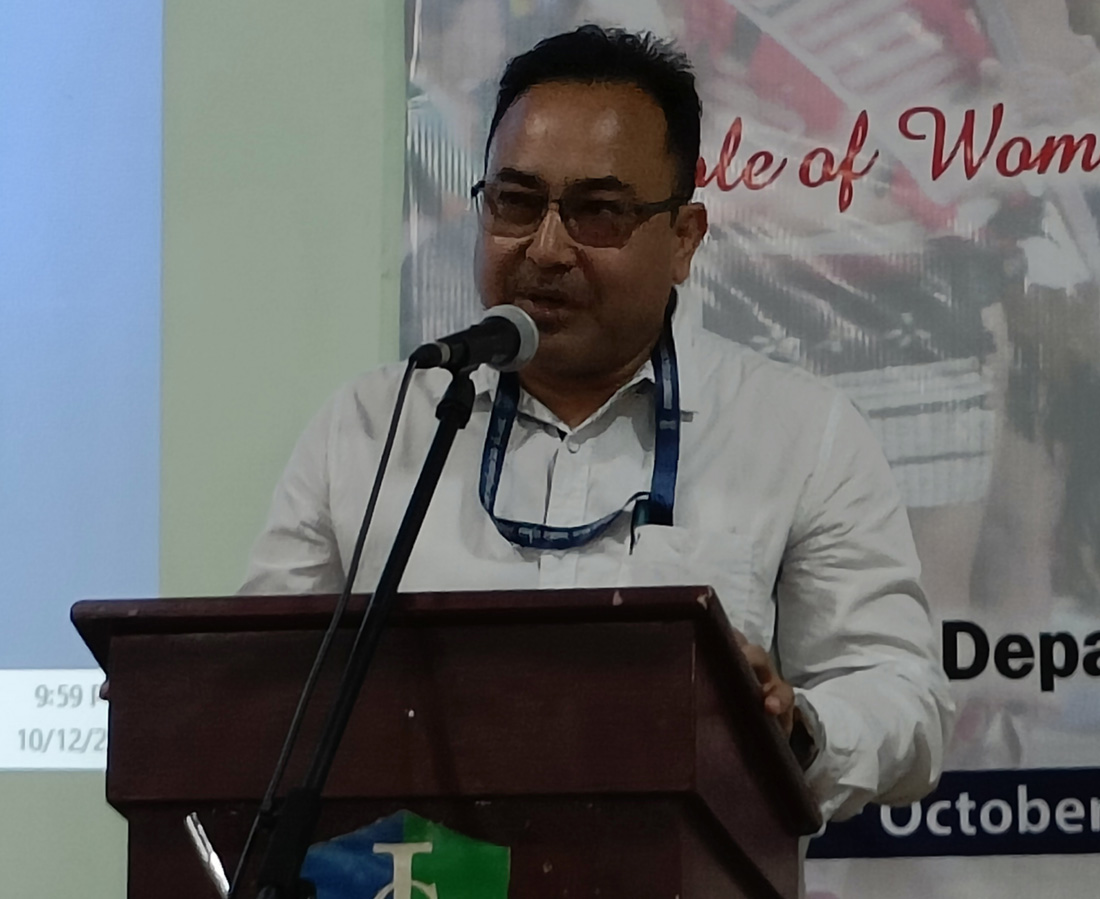Published on Oct 14, 2022
Share

Our Reporter
Dimapur, Oct. 13 (EMN): Much progress has been made in the field of education and employment, especially in the urban areas, yet empowerment in the real sense is debatable as Naga women do not have real decision making powers within their home, community, over land and others, stated Nchumbeni S Ovung, research scholar, department of Economics from St. Joseph University.
She was speaking on the topic “A study on the role of women-centric schemes towards women empowerment in Nagaland” at a one-day national seminar on “Role of women in preserving cultural heritage in North East India organised by North East Zone Cultural Centre (NEZCC), Dimapur, in collaboration with department of Education, Immanuel College, Dimapur.
She stated that Naga society is patriarchal and ‘believes women must be respected, but the traditional law clearly distinguishes gender roles and gendered responsibilities’.
Ovung stated that that women are in-charge of ‘domestic issues’ while men ‘deal with society’ including village administration and councils.
“Naga women are therefore still excluded from the decision making and inheritance of ancestral or self acquired land. The impression about women being empowered in Naga society is largely a myth”, she added.
Women-centric schemes like One Stop Centre, Women Helpine 181, Beti Bachao Beti Padhao, Mahila Shakti Kendra and Women Empowerment, support women and girl child with education and health, encourages them to be more independent, participate in decision making, and gives training on different activities, she added.
Rev. Fr. Sunny Joseph, Professor of St. Joseph University, Dimapur, said in most cultures, the dominant voices have been male.
‘One impact of that has generally been a gendered view of how best to organise cultural life, and that has reduced the rights of women (and other minorities) in myriad ways, often to their disadvantage as well as against their will’, he shared.
In the context of Northeast, he said that ‘women are conscious of culture, find attire as a sign of culture, and work for social change, and they also preserve culture through informal education and performing arts’.
He stated that the challenges for women in preserving the culture includes invasion of media, marriages outside the region and social mobility.
‘Women play an important role in bringing up culture so give equal opportunity to them. Never neglect the women, instead respect and give them the best opportunity so that they can contribute the best to the society for the benefit of the country’, he added.
Women have been the backbone in the preservation of Naga cultural heritage but over the years, a new breed of women have seeped into the society, asserted Ngutoli Y Swu, assistant professor, Zunheboto Government College on Thursday.
This new breed is the ‘modern’ Naga woman, who is skilled in her crafts, honed through the technological advancement, Swu said.
She stated that this breed of women, ‘in the quest for creativity and fusion, has been misusing and misinterpreting the traditional knowledge especially Naga textiles’.
She was speaking on the topic “Custodians or Desecrators?: A critical study of Naga women on culture”, She shared that her research study aims to look at how Naga women over the centuries have been custodians of the Naga culture but with the onset of the 21st century, ‘this role is shifting with the rise of a breed of Naga women who knowingly or unknowingly is taking a plunge, which may in the long run cause knowledge gaps in the way Naga culture is perceived and carried forward’.
“The thin line between what is 'authentic' and 'recreated' may get lost in the long run, therefore remedial measures that can be taken to achieve a balance is sought through this paper”, she said.
Prashanna Gogoi, Director of NEZCC, Dimapur, said that the government of India is emphasising on empowering women, and therefore asked everyone to support them.
He also opined that the slogan Beti Bachao Beti Padhao does not apply in Nagaland because ‘equal importance is given to both boy and girl child’.
‘Others states should learn from NE India states, because there is no difference between men and women here’, he said.